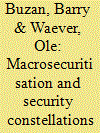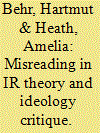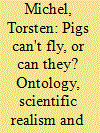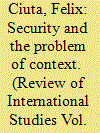|
|
|
Sort Order |
|
|
|
Items / Page
|
|
|
|
|
|
|
| Srl | Item |
| 1 |
ID:
088088


|
|
|
|
|
| Publication |
2009.
|
| Summary/Abstract |
The Copenhagen school's theory of securitisation has mainly focused on the middle level of world politics in which collective political units, often but not always states, construct relationships of amity or enmity with each other. Its argument has been that this middle level would be the most active both because of the facility with which collective political units can construct each other as threats, and the difficulty of finding audiences for the kinds of securitisations and referent objects that are available at the individual and system levels. This article focuses on the gap between the middle and system levels, and asks whether there is not more of substance there than the existing Copenhagen school analyses suggests. It revisits the under-discussed concept of security constellations in Copenhagen school theory, and adds to it the idea of macrosecuritisations as ways of getting an analytical grip on what happens above the middle level. It then suggests how applying these concepts adds not just a missing sense of scale, but also a useful insight into underlying political logics, to how one understands the patterns of securitisation historical, and contemporary.
|
|
|
|
|
|
|
|
|
|
|
|
|
|
|
|
| 2 |
ID:
088095


|
|
|
|
|
| Publication |
2009.
|
| Summary/Abstract |
This article is interested in the hegemony which neo-realism accomplished during the second half of the 20th century in both the academic field and policy making of I/international R/relations. Our examination posits the argument that neo-realism can be seen as an ideology rather than a theory of international politics. While this view can connect to individual voices from the 1960s as well as to an emerging body of critical literature since the 1990s, we propose an ideology critique to explore this argument. To unfold this approach we will elaborate some neo-realist misreadings which we think manipulate intellectual history (among others, the writings of Hans J. Morgenthau) and represent an ideological impact intrinsic in the development of IR. An ideology critical approach - which is inherent in Morgenthau's thoughts on international theory themselves and thus helps to reveal profound discrepancies at the heart of an ostensible 'realist'-neo-realist 'unity' - has, firstly, to problematise those discrepancies and, secondly, to focus on hegemonic strategies applied to ideologise and mainstream the academic field. The first part of such an agenda is what we present here; the second part is what we outline methodologically and suggest for further studies in, and of, IR.
|
|
|
|
|
|
|
|
|
|
|
|
|
|
|
|
| 3 |
ID:
088100


|
|
|
|
|
| Publication |
2009.
|
| Summary/Abstract |
What has been traditionally conceptualised as 'the international' has been undergoing a fundamental transformation in recent decades, usually called 'globalisation'. Globalisation is a highly contested concept, and even among those who accept that some sort of globalisation process is occurring, attempts to analyse it have focused on a range of structural explanations: the expansion of economic transactions; the development of transnational or global social bonds; and the emergence and consolidation of a range of semi-international, semi-global political institutions. In all of these explanations, the role of actors as agents strategically shaping change has been neglected. In this article I argue that structural variables alone do not determine specific outcomes. Indeed, structural changes are permissive and can be the source of a range of potential multiple equilibria. The interaction of structural constraints and actors' strategic and tactical choices involves a process of 'structuration', leading to wider systemic outcomes. In understanding this process, the concepts of 'pluralism' and 'neopluralism' as used in traditional 'domestic'-level Political Science can provide an insightful framework for analysis. This process, I argue, has developed in five interrelated, overlapping stages that involve the interaction of a diverse range of economic, social and political actors. Globalisation is still in the early stages of development, and depending on actors' choices in a dynamic process of structuration, a range of alternative potential outcomes can be suggested.
There is a tide in the affairs of men
Which, taken at the flood, leads on to fortune;
Omitted, all the voyage of their life
Is bound in shallows and in miseries.
On such a full sea are we now afloat,
And we must take the current when it serves,
Or lose our ventures.
(William Shakespeare, Julius Caesar, IV.ii.269-276)
|
|
|
|
|
|
|
|
|
|
|
|
|
|
|
|
| 4 |
ID:
088097


|
|
|
|
|
| Publication |
2009.
|
| Summary/Abstract |
This article examines the assumptions that underlie Noam Chomsky's politics and argues that his analysis of US foreign policy since World War II may best be situated within the realist tradition in international relations. Chomsky's left realism has not been adequately understood or addressed by IR scholars for both political and disciplinary reasons. In opposition to most classical realists, he has insisted that intellectuals should resist rather than serve national power interests. In contrast to most political scientists, he has also refused to theorize, critiquing much of the enterprise of social science in terms of what he sees as highly suspect power interests within the academy. Hostility to Chomsky's normative commitments has consequently prevented IR scholars from discerning key aspects of his project, as well as important historical and theoretical continuities between radical and realist thought.
|
|
|
|
|
|
|
|
|
|
|
|
|
|
|
|
| 5 |
ID:
088098


|
|
|
|
|
| Publication |
2009.
|
| Summary/Abstract |
This article argues that scientific and critical realism have embraced several mistaken claims, among them that social science enquiry cannot proceed unless the theoretical objects of study are specified in advance. The article argues, rather, that although pre-scientific, observable objects and events must be specified from the outset, theoretical objects come to our attention only in the course of formulating theories. The article advances an alternative to scientific realist and critical realist foundations, namely, causal conventionalism, which is an adaptation to the social sciences of several elements of Pierre Duhem's conventionalist account of physical science. The article argues that major goals of theorising that scientific realism and critical realism seek to fulfill are better satisfied by the conventionalist alternative. In an effort to clarify some important issues, the article identifies and responds to a series of related criticisms of my views offered by Colin Wight in his recent article 'A Manifesto for Scientific Realism in IR: Assuming the Can-Opener Won't Work!' in 'Millennium', and in his book, Agents, Structures and International Relations: Politics as Ontology.
|
|
|
|
|
|
|
|
|
|
|
|
|
|
|
|
| 6 |
ID:
088099


|
|
|
|
|
| Publication |
2009.
|
| Summary/Abstract |
In recent debates in IR theory a specific trend has evolved which advocates a renewed focus on matters of ontology as a way to overcome or at least to reconceptualise the divides within the field of IR that we encounter especially after the considerable widening of scope after the end of the Cold War. Responding to these claims the article sets out to provide a closer look at the different arguments presented for a renewed concern with ontology and its ramifications. With this task in mind, three particular complexes will be addressed. First, we have to identify the central claims of these new ontological approaches and assess them in respect to coherence and analytic rigour. Secondly, then, we will proceed with identifying the underlying reasons for their shortcomings which as will be shown lie with the misguided concept of ontology. If this conception is properly reworked, can indeed bring new light into otherwise protracted or even deadlocked debates.
|
|
|
|
|
|
|
|
|
|
|
|
|
|
|
|
| 7 |
ID:
088090


|
|
|
|
|
| Publication |
2009.
|
| Summary/Abstract |
This article provides a critique of the securitisation framework around its ability to provide a comprehensive security analysis when applied in a developing socio-political context. It argues that the framework's conditionalities around who can securitise and how, and its assumptions around the nature of the state restrict its ability to consider the role of non-state actors in raising existential threats to societal security. Through a case study of newspapers in Bangladesh raising 'misgovernance' as a security threat to its citizens, it explores how the securitisation framework can become more perceptive to security dynamics in contexts which differ from the one within which the framework has evolved.
|
|
|
|
|
|
|
|
|
|
|
|
|
|
|
|
| 8 |
ID:
088091


|
|
|
|
|
| Publication |
2009.
|
| Summary/Abstract |
How do we know when we are dealing with security issue? This is a cardinal question in Security Studies, and securitisation theory provides and authoritative yet incomplete answer, mainly because it rules out that the meaning of security can vary contextually. To overcome this limitation, we need a hermeneutical perspective centred on the liminality of security as a category in-between theory and policy, which produces a more precise algorithm for empirical research. A contextual hermeneutics of security signals that normative awareness is necessary even in the absence of a unifying normative manifesto, also confronts the spectre of the "death of security" invoked by those who object to the potentially endless broadening of its meaning.
|
|
|
|
|
|
|
|
|
|
|
|
|
|
|
|
| 9 |
ID:
088101


|
|
|
|
|
| Publication |
2009.
|
| Summary/Abstract |
This article develops a twofold critique: on the one hand it addresses those accounts commonly associated with the Varieties of Capitalism literature and their associated understanding of neo-liberalism to argue that there is a dominant tendency to collapse into a binary analysis that asserts either we are witnessing convergence or we are experiencing path dependency. On the other hand it addresses 'neo-Gramscian' accounts which tend to overemphasise processes of transnational convergence and the emergence of a transnational capitalist class at the expense of the embeddedness of capital in national-domestic contexts. On this basis, it is argued that several contributions within political geography pose meaningful questions about the premise that neo-liberalism is inherently variegated. Principally, this involves developing the notion of variegated neo-liberalism to analyse the dynamics of a contingent neo-liberal consensus between transnationally-oriented fractions that both drives EU reform in a neo-liberal direction and reinforces domestic linkages organic to the national context. As a result, the article suggests we therefore reject the notion of a transnational capitalist class somehow detached from the national.
|
|
|
|
|
|
|
|
|
|
|
|
|
|
|
|
|
|
|
|
|